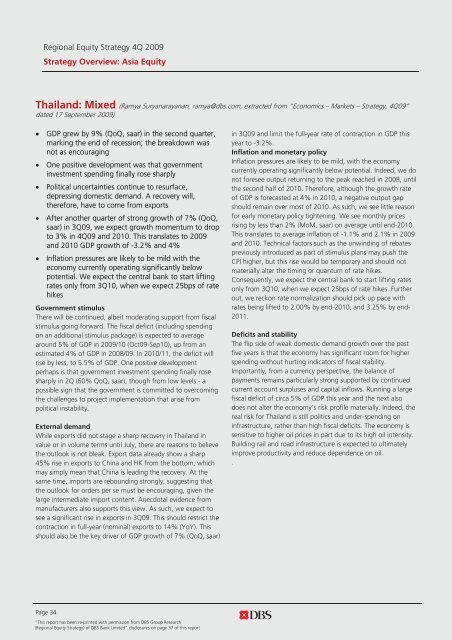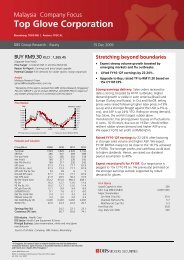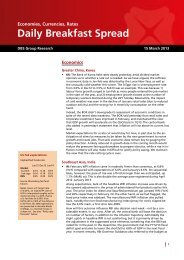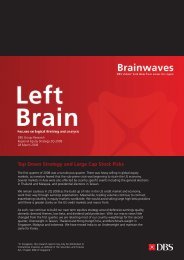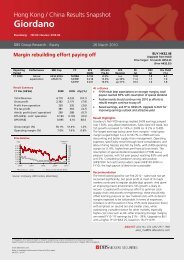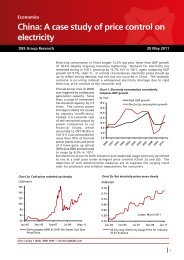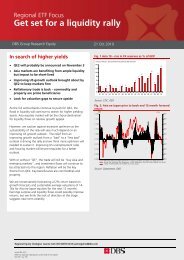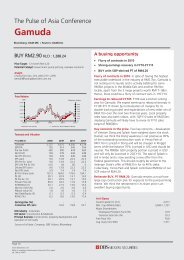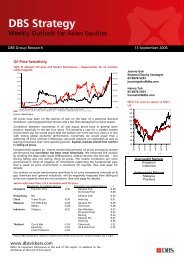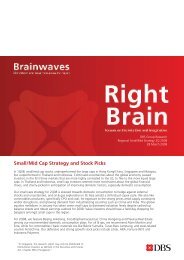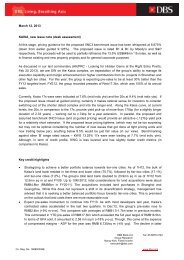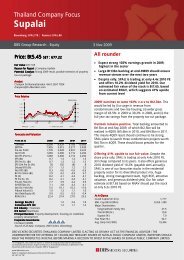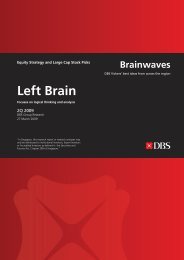Left Brain Right B - the DBS Vickers Securities Equities Research
Left Brain Right B - the DBS Vickers Securities Equities Research
Left Brain Right B - the DBS Vickers Securities Equities Research
Create successful ePaper yourself
Turn your PDF publications into a flip-book with our unique Google optimized e-Paper software.
Regional Equity Strategy 4Q 2009<br />
Strategy Overview: Asia Equity<br />
Thailand: Mixed (Ramya Suryanarayanan, ramya@dbs.com, extracted from “Economics – Markets – Strategy, 4Q09”<br />
dated 17 September 2009)<br />
• GDP grew by 9% (QoQ, saar) in <strong>the</strong> second quarter,<br />
marking <strong>the</strong> end of recession; <strong>the</strong> breakdown was<br />
not as encouraging<br />
• One positive development was that government<br />
investment spending finally rose sharply<br />
• Political uncertainties continue to resurface,<br />
depressing domestic demand. A recovery will,<br />
<strong>the</strong>refore, have to come from exports<br />
• After ano<strong>the</strong>r quarter of strong growth of 7% (QoQ,<br />
saar) in 3Q09, we expect growth momentum to drop<br />
to 3% in 4Q09 and 2010. This translates to 2009<br />
and 2010 GDP growth of -3.2% and 4%<br />
• Inflation pressures are likely to be mild with <strong>the</strong><br />
economy currently operating significantly below<br />
potential. We expect <strong>the</strong> central bank to start lifting<br />
rates only from 3Q10, when we expect 25bps of rate<br />
hikes<br />
Government stimulus<br />
There will be continued, albeit moderating support from fiscal<br />
stimulus going forward. The fiscal deficit (including spending<br />
on an additional stimulus package) is expected to average<br />
around 5% of GDP in 2009/10 (Oct09-Sep10), up from an<br />
estimated 4% of GDP in 2008/09. In 2010/11, <strong>the</strong> deficit will<br />
rise by less, to 5.5% of GDP. One positive development<br />
perhaps is that government investment spending finally rose<br />
sharply in 2Q (60% QoQ, saar), though from low levels - a<br />
possible sign that <strong>the</strong> government is committed to overcoming<br />
<strong>the</strong> challenges to project implementation that arise from<br />
political instability.<br />
External demand<br />
While exports did not stage a sharp recovery in Thailand in<br />
value or in volume terms until July, <strong>the</strong>re are reasons to believe<br />
<strong>the</strong> outlook is not bleak. Export data already show a sharp<br />
45% rise in exports to China and HK from <strong>the</strong> bottom, which<br />
may simply mean that China is leading <strong>the</strong> recovery. At <strong>the</strong><br />
same time, imports are rebounding strongly, suggesting that<br />
<strong>the</strong> outlook for orders per se must be encouraging, given <strong>the</strong><br />
large intermediate import content. Anecdotal evidence from<br />
manufacturers also supports this view. As such, we expect to<br />
see a significant rise in exports in 3Q09. This should restrict <strong>the</strong><br />
contraction in full-year (nominal) exports to 14% (YoY). This<br />
should also be <strong>the</strong> key driver of GDP growth of 7% (QoQ, saar)<br />
in 3Q09 and limit <strong>the</strong> full-year rate of contraction in GDP this<br />
year to -3.2%.<br />
Inflation and monetary policy<br />
Inflation pressures are likely to be mild, with <strong>the</strong> economy<br />
currently operating significantly below potential. Indeed, we do<br />
not foresee output returning to <strong>the</strong> peak reached in 2008, until<br />
<strong>the</strong> second half of 2010. Therefore, although <strong>the</strong> growth rate<br />
of GDP is forecasted at 4% in 2010, a negative output gap<br />
should remain over most of 2010. As such, we see little reason<br />
for early monetary policy tightening. We see monthly prices<br />
rising by less than 2% (MoM, saar) on average until end-2010.<br />
This translates to average inflation of -1.1% and 2.1% in 2009<br />
and 2010. Technical factors such as <strong>the</strong> unwinding of rebates<br />
previously introduced as part of stimulus plans may push <strong>the</strong><br />
CPI higher, but this rise would be temporary and should not<br />
materially alter <strong>the</strong> timing or quantum of rate hikes.<br />
Consequently, we expect <strong>the</strong> central bank to start lifting rates<br />
only from 3Q10, when we expect 25bps of rate hikes. Fur<strong>the</strong>r<br />
out, we reckon rate normalization should pick up pace with<br />
rates being lifted to 2.00% by end-2010, and 3.25% by end-<br />
2011.<br />
Deficits and stability<br />
The flip side of weak domestic demand growth over <strong>the</strong> past<br />
five years is that <strong>the</strong> economy has significant room for higher<br />
spending without hurting indicators of fiscal stability.<br />
Importantly, from a currency perspective, <strong>the</strong> balance of<br />
payments remains particularly strong supported by continued<br />
current account surpluses and capital inflows. Running a large<br />
fiscal deficit of circa 5% of GDP this year and <strong>the</strong> next also<br />
does not alter <strong>the</strong> economy’s risk profile materially. Indeed, <strong>the</strong><br />
real risk for Thailand is still politics and under-spending on<br />
infrastructure, ra<strong>the</strong>r than high fiscal deficits. The economy is<br />
sensitive to higher oil prices in part due to its high oil intensity.<br />
Building rail and road infrastructure is expected to ultimately<br />
improve productivity and reduce dependence on oil.<br />
.<br />
Page 34<br />
“This report has been re-printed with permission from <strong>DBS</strong> Group <strong>Research</strong><br />
(Regional Equity Strategy) of <strong>DBS</strong> Bank Limited” disclosures on page 37 of this report


